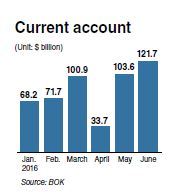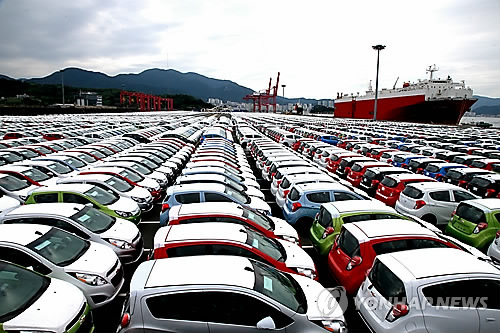Korea's exports fall 10%
Korea extends record surplus on falling oil prices
By Park Hyung-kiPublished : Aug. 1, 2016 - 15:46
South Korea’s current account surplus extended its record for the 52nd consecutive month in June, but the record surplus was mostly due to falling oil prices rather than an increase in exports over imports on global demand, according to the Bank of Korea on Monday.
The current account surplus, the broadest measure of trade, hit a record of $12.17 billion in June, the biggest since the central bank began collecting the trade data in 1980.

The June surplus gained $300 million, compared to a year ago, but its accumulated surplus from January-June at $49.98 billion was below $50.36 billion in the first half of last year, the BOK’s provisional data showed.
With exports and imports falling on global overcapacity and decreasing demand beset by a slowdown, the central bank forecast that the surplus in 2016 will not likely extend its gain of over 100 billion from last year when the annual surplus reached $105.8 billion.

The central bank expects the surplus to reach $95 billion this year.
“This forecast comes amid a monetary uncertainty in the U.S., the Brexit and a slowdown in China,” a BOK official said.
The country’s monthly record surplus may have offset the widening service deficit of $1.38 billion on growing overseas travelers and a transportation industry slump.
But Korea’s exports, the main driver of its growth, continued to lose steam with its outbound shipments falling 7.4 percent in June from a year ago, despite decreasing oil prices, which can lower manufacturing prices of goods.
The Ministry of Trade, Industry and Energy also reported that exports in July fell more than 10 percent at $41 billion in July on-year, while imports decreased 14.4 percent at $33.3 in the same period.
In addition to falling oil prices, the faster decrease of imports over that of exports helped Asia’s fourth-largest economy to extend its record surplus, officials said.
“The suitable level of a country’s surplus in proportion to one’s gross domestic product is around 2-3 percent. In case of Korea, it is around 7 percent. An excessive surplus can bring about a side effect,” Bank of Korea Gov. Lee Ju-yeol said in a recent economic forum.
By Park Hyong-ki (hkp@heraldcorp.com)
The current account surplus, the broadest measure of trade, hit a record of $12.17 billion in June, the biggest since the central bank began collecting the trade data in 1980.

The June surplus gained $300 million, compared to a year ago, but its accumulated surplus from January-June at $49.98 billion was below $50.36 billion in the first half of last year, the BOK’s provisional data showed.
With exports and imports falling on global overcapacity and decreasing demand beset by a slowdown, the central bank forecast that the surplus in 2016 will not likely extend its gain of over 100 billion from last year when the annual surplus reached $105.8 billion.

The central bank expects the surplus to reach $95 billion this year.
“This forecast comes amid a monetary uncertainty in the U.S., the Brexit and a slowdown in China,” a BOK official said.
The country’s monthly record surplus may have offset the widening service deficit of $1.38 billion on growing overseas travelers and a transportation industry slump.
But Korea’s exports, the main driver of its growth, continued to lose steam with its outbound shipments falling 7.4 percent in June from a year ago, despite decreasing oil prices, which can lower manufacturing prices of goods.
The Ministry of Trade, Industry and Energy also reported that exports in July fell more than 10 percent at $41 billion in July on-year, while imports decreased 14.4 percent at $33.3 in the same period.
In addition to falling oil prices, the faster decrease of imports over that of exports helped Asia’s fourth-largest economy to extend its record surplus, officials said.
“The suitable level of a country’s surplus in proportion to one’s gross domestic product is around 2-3 percent. In case of Korea, it is around 7 percent. An excessive surplus can bring about a side effect,” Bank of Korea Gov. Lee Ju-yeol said in a recent economic forum.
By Park Hyong-ki (hkp@heraldcorp.com)



![[Exclusive] Korean military set to ban iPhones over 'security' concerns](http://res.heraldm.com/phpwas/restmb_idxmake.php?idx=644&simg=/content/image/2024/04/23/20240423050599_0.jpg&u=20240423183955)
![[AtoZ into Korean mind] Humor in Korea: Navigating the line between what's funny and not](http://res.heraldm.com/phpwas/restmb_idxmake.php?idx=644&simg=/content/image/2024/04/22/20240422050642_0.jpg&u=)


![[Graphic News] 77% of young Koreans still financially dependent](http://res.heraldm.com/phpwas/restmb_idxmake.php?idx=644&simg=/content/image/2024/04/22/20240422050762_0.gif&u=)











![[Today’s K-pop] Ateez confirms US tour details](http://res.heraldm.com/phpwas/restmb_idxmake.php?idx=642&simg=/content/image/2024/04/23/20240423050700_0.jpg&u=)